|
 Become
a fan on Facebook
Become
a fan on Facebook  Follow
on Twitter Follow
on Twitter
Article by Mark Dujsik | December 26,
2014
Here
are the ten best films of 2014:
 10.
Two Days, One Night 10.
Two Days, One Night
Unless
her co-workers vote against a bonus, Sandra (Marion Cotillard) will be fired. At
a cursory glance, the choice—between money and another person's
livelihood—appears to be a simple morality test, but if one presumes that the
basic nature of humanity is good and decent, the revelation that Sandra's
co-workers have voted against her will be disheartening. Two
Days, One Night, the latest film written and directed by brothers Jean-Pierre
and Luc Dardenne, isn't just about simple morality or the question, "What
would you do?" The film puts the employees' decision to the test of
reality, where people struggle financially, feel pressure from others to make
choices they otherwise wouldn't, and are, sometimes, just plain selfish. The
Dardennes sympathize with Sandra, but what's surprising is how much sympathy
they pass on to the other characters. Sandra's weekend trying to convince her
co-workers to vote for her may not sound particularly dramatic, but with the
stakes the film establishes, it is plenty dramatic. We see patterns among the
employees, and patterns are even more important in the film's incisive study of
Sandra, a woman struggling with depression. Cotillard's tremendous performance
of delicate variations elevates the material to another level of compassionate
observation.
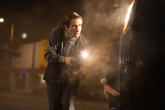 9.
Nightcrawler 9.
Nightcrawler
The
question of Nightcrawler is not if
this is where the news media is heading. The question is: Is this where the news
media is? It would be comforting to see writer/director Dan Gilroy's debut film
as satire, but there is too much real-world evidence of the sensationalism and
tabloidization of the news to observe the film in that light. Gilroy localizes
and specifies the issues, observing the cutthroat world of freelance
"journalists" who specialize in bloody crime and accident scenes
throughout Los Angeles. From there, we get the bigger picture. There's something
rotten in the state of journalism, and the emblem of that rot is Louis Bloom,
played in a daring, go-for-broke performance by Jake Gyllenhaal. Louis is a
sociopathic petty criminal with dreams of making money in the quickest way
possible. As the protagonist goes about finding and, later, causing gruesome
scenes, Gilroy and cinematographer Robert Elswit (who captures the city in
threatening and imposing shadows) have an ingenious way of simultaneously making
us part of and separated from Louis' work. We start to think that only someone
as extreme as Bloom could really thrive in this field, and that is the most
frightening commentary in a film full of discomforting ones.
 8.
Life Itself 8.
Life Itself
There's
no denying that I have a bit of a bias when it comes to Roger Ebert, whose life
and death are documented in Life Itself.
Does
that mean director Steve James' film about the most famous film critic to ever
write about the movies shouldn't be considered for this list? Of course, it
doesn't. This is an empathetic, affectionate, and, at times, shattering film
that honors its subject through its candor. It gives us the high points (his
professional rivalry/cooperation and rocky friendship with Gene Siskel, his
marriage to Chaz, and his Pulitzer Prize—a first for a film critic), the
cloudy times (his drinking days, highlighted by a strange Hollywood adventure),
and the devastating but inspiring last chapter of Ebert's life. James even gives
us a film that stresses the influence of Ebert's writing. The film's most
extraordinary accomplishment, though, is how bravely it depicts the ravages of
illness. Ebert was never shy about his health in his final years, and in scenes
in his hospital room, he directs James to keep the camera running. The film was
not originally intended to be an obituary, but as one, it is as honestly kind
and kindly honest a tribute as anyone could receive.
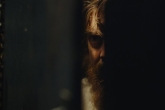 7.
Blue Ruin 7.
Blue Ruin
The
characters in Blue Ruin run the gamut
of how much the past has affected them. Even the film's most stable character
admits that she's haunted by common sights that have come to symbolize that
sometimes the bad people don't get what should be coming to them.
Writer/director Jeremy Saulnier's revenge thriller begins where most movies in
this genre end: The bad guy gets what's coming to him. The good guy is Dwight
(Macon Blair), whose parents were murdered 20 years prior and who has never
recovered. When the man who killed them is released from prison, Dwight gives
him a bloody, undignified end in the filthy bathroom of a bar. That's when the
murderer's family comes after Dwight to give him what's coming. This is ugly
business, but the clever part is that Dwight knows what to do but isn't
experienced enough to think through the details. Saulnier treats the material
with deathly sincerity, but he's also not afraid to inject some mischievous
gallows humor into the proceedings. The film portrays the difficulties of the
particulars, the ease of success, and the ultimate pointlessness of revenge.
There's something extraordinarily ordinary about the film's approach that cuts
right through the thin skin of vengeance.
 6.
Boyhood 6.
Boyhood
This
12-year production allows us to bear witness as a boy becomes a man. Boyhood, writer/director Richard Linklater's boldly experimental
film, is all about the process of becoming. The conceit, in which Linklater
filmed the same actors for over a decade, is a gimmick, to be sure, but an
essential one, for here is also a film that captures the essence of memory.
There are milestones in the life of Mason (Ellar Coltrane), who ages from 6 to
18 in a relative flash, but they take place off-screen. Isn't that how memory
operates? Instead, we see the little moments, and while it's a cliché that the
little moments are the ones that really matter, that's because it's true. Thanks
to editor Sandra Adair, the film moves from one year to the next without any
buffer. Time is marked by growth spurts, hair length, and the deepening pitch of the
boy's voice. We are constantly watching the growth of these characters, who
include Mason's divorced mother (Patricia Arquette, in a heartbreaking
performance) and father (Ethan Hawke). They learn from positive experiences and
mistakes in equal measure. As a result, every scene feels like the culmination
of everything that has preceded it. Every moment is one of becoming in a world
composed of life's momentous little things.
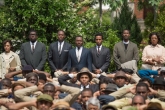 5.
Selma 5.
Selma
Everything
is politics. That is the key lesson of Selma, director Ava DuVernay's incredibly intelligent and resolutely
patient depiction of the buildup to the protest march from the eponymous
city to Montgomery in 1965. It's not politics in the way the term has been
diluted as of late to mean political parties, left and right, or other
distinctions that emphasize conflict. It's the machinations, maneuvers, and
mediations conducted on a private scale in church halls and the Oval Office, as
well as more public displays through rallies and speeches. The film is
comprehensive in its portrait of not only the moral necessity of the civil
rights movement and legislation but also the practical need for them. The latter
is summarized in an early analysis by Martin Luther King Jr. (David Oyelowo,
giving a performance that encapsulates the spirit of that great man), tying
together the lack of justice for African Americans in the courts with the
Constitutional right to vote, hindered by Jim Crow laws. We get the full
picture, from discussions with President Lyndon Johnson (Tom Wilkinson) to
racism thinly disguised as "states' rights" on the part of George
Wallace (Tim Roth)—from the FBI's involvement in King's personal affairs to
the troubled but solid relationship between King and his wife Coretta (Carmen
Ejogo). That the injustices shown in the film are still relevant today is a
depressing commentary on our times.
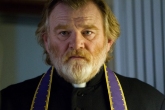 4.
Calvary 4.
Calvary
Writer/director
John Michael McDonagh's exceptional and exceptionally thoughtful Calvary is a stirring examination of faith. It primarily concerns a
group of people who have the outward appearance of believing but have taken the
notion for granted. Their actions do not reflect what they purport to believe.
Among their company is Father James Lavelle (Brendan Gleeson), a good priest,
who has been targeted to be murdered by one of his parishioners as an act of
revenge against the Church for the sexual abuse the parishioner suffered as a
child. The man gives James, who is targeted because he is good and innocent, a
week's time to put his affairs in order. As James tries to determine whether or
not to stay for his appointment with death, the film unfolds as a series of
sincere and, at times, wickedly funny dialogues about faith, responsibility,
moral decisions, the specific context in which those decisions are made, and,
ultimately, forgiveness. Gleeson is the film's anchor, and his performance is
one of weariness and frustration at constant battle with conviction and
integrity. What McDonagh understands—and quite wisely—is that faith is not
merely a matter of belief. It is one of choice and of making choices. In the
end, there is only one choice that matters here, and it's not the one McDonagh
establishes at the beginning. The powerful, unanswered question that lingers at
the film's conclusion is left to us to decide.
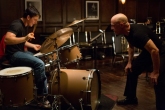 3.
Whiplash 3.
Whiplash
Damien
Chazelle's Whiplash does not take
talent and creativity for granted. It's a film about practice: the lonely hours
refining a craft and the long nights rehearsing. Above all else, the film is
about the passion necessary to devote oneself to this process. Here, the passion
of a promising drummer named Andrew (Miles Teller, performing a delicate
balancing act between intelligence and naiveté—in addition to the drumming)
is either appropriately extreme or woefully misguided. He wants to be one of the
greats. His teacher Terence Fletcher (J.K. Simmons, a prowling and
ready-to-explode force) thinks Andrew could be, too, so the teacher starts a
systematic process of torture and abuse to inspire the greatness in the student.
Is the student a victim or a willing participant in a relationship that serves
both men's interests? Chazelle leaves it to us to answer that question. In the
process, he gives us a film with a keen knowledge of and wisdom about these
characters and the world in which they have chosen to live. There's an urgent
and palpable sense of Chazelle's need to tell this story that is thrilling (as
is Tom Cross' rhythmic and dynamic editing). The story comes to a natural
endpoint, but it's not enough for the writer/director. There are consequences to
their relationship and a sense of mounting dread as a seemingly ordinary
epilogue continues to evolve that relationship. At the end of the film, we're
still dreading what's to come for these two characters.
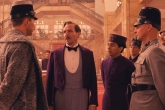 2.
The Grand Budapest Hotel 2.
The Grand Budapest Hotel
Another
storybook adventure from writer/director Wes Anderson, The
Grand Budapest Hotel is also another display of why he is among the most
unique American voices in modern cinema. His usual quirkiness is on full
display, but so is his characteristically meticulous craftsmanship. The film is
something entirely different from Anderson, though, even while the particulars
are familiar. It reflects an artistic and philosophical evolution for the
director. The story spans four eras (Anderson and cinematographer Robert D.
Yeoman complement each period with the period-appropriate aspect ratio),
starting with a present-day memento mori
in a cemetery and moving back and back and back to 1932. Europe is on the brink
of war, and in the fictional country of Zubrowska sits the eponymous hotel,
represented in a dreamy mixture of paintings and models and automated toys.
Within it, M. Gustave (a note-perfect Ralph Fiennes in a precise comic
performance), the hotel's charmingly foppish and genteelly profane concierge,
takes a young lobby boy (Tony Revolori) under his wing.
Inspired
by the works of writer Stefan Zweig, the film is a smorgasbord of narrative
concerns: partly a comedy of manners, a penny dreadful, a coming-of-age story,
and an examination of geopolitical and intranational tensions. It's a comedy but
an elementally somber one. The film is nihilistic on its surface (Gustave
informs his apprentice that none of it matters), but even at his most
pessimistic and elegiac, Anderson offers a film that is cheerily and
intoxicatingly affirming. The film may end where it begins—where all stories
must end—but the stories here endure, which is at least a comforting thought.
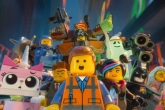 1.
The LEGO Movie 1.
The LEGO Movie
Yes,
I'm surprised about this, too, but in case there's any doubt, here it is
again: The LEGO Movie is the best film of 2014. There are plenty of reasons
to approach the film with skepticism, primarily its outward appearance as a
lengthy commercial likely meant to "increase brand awareness." The end
product, though, puts that skepticism to bed for 100 minutes of unbridled
imagination, absurdist humor, pointed satire about consumerist culture,
technical proficiency, and an attitude of "Anything goes." There's a simple story, featuring an ordinary character—a construction worker
named Emmet (voice of Chris Pratt)—who reluctantly becomes a hero to fulfill a
world-saving destiny. From that basic template, though, we get the constant
sense of screenwriters/directors Phil Lord and Christopher Miller calling for
more: more figures from popular culture and history who shouldn't have a place
here, more silly things for them to say, more craziness in the world design,
and, moreover, a pirate with a shark for an arm. Anything goes.
It's
playtime for the filmmakers, whose love of these toys is only
outdone by love for the ability to imagine just about anything and see it come
to life. When we're not smiling or laughing at the assault of gags, we're
astonished by the intricate level of detail to these worlds (Everything here has
been "assembled" with the blocky toys) and how the computer animation
uncannily simulates the jittery imperfection of stop-motion animation. There are
so many disparate ingredients jammed together here (The film's climax even
reveals an affecting emotional core that redefines events in a human context),
yet the film finds an inherent order in the chaos. It's an exhilarating,
absolute joy to watch it all come together.
Honorable Mention:
Dawn
of the Planet of the Apes, Foxcatcher,
How
to Train Your Dragon 2, Interstellar,
Jodorowsky's Dune, Last
Days in Vietnam, Night
Moves, Non-Stop, Nymphomaniac
(Vol. I and Vol.
II), The Tale
of the Princess Kaguya, They Came
Together, Wild
Copyright © 2013 by Mark Dujsik. All
rights reserved.
 Back
to Home Back
to Home
|
Buy Related Products

|
